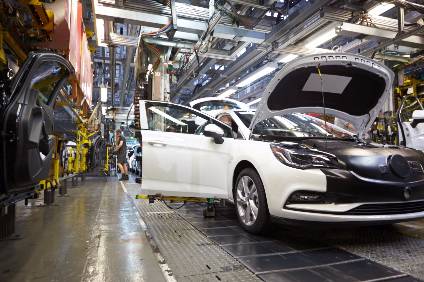
UK car production declined by 1.4% in November to 106,243 units, according to the latest figures issued by the Society of Motor Manufacturers and Traders (SMMT). November’s drop leaves year-to-date output down 31% on the same period last year as the industry faced decimated markets earlier in the year due to the Covid pandemic.
The SMMT also called on Brexit negotiators (the UK and EU are in last-minute talks to do a free trade deal and avoid default WTO tariffs from 1st January) to ‘seal the deal’ before Christmas to avoid ‘irrevocable damage of tariffs to critical automotive sector and jobs’.

Discover B2B Marketing That Performs
Combine business intelligence and editorial excellence to reach engaged professionals across 36 leading media platforms.
November saw 1,501 fewer cars made than in the same month last year, as many of the factors present throughout much of 2020 conspired to dampen domestic orders, not least a second national lockdown in England and subsequent economic and political turbulence. Export volumes were flat, up just 0.3% and equivalent to a rise of 310 units, boosted by shipments to key markets in the EU, Asia and the US.
The SMMT noted that more than eight in 10 (85.3%) cars built in November were built for export, highlighting the critical importance of free and fair trade with global markets to UK car makers.
In the 11 months to November, total UK car production is now down 31.0% compared with the same period in 2019, representing a loss of 380,809 models at a cost of some GBP10.5 billion to the sector.
The SMMT says this puts the industry on course to produce fewer than a million cars this year for only the second time since the early eighties and facing a tough future with potential further production losses amounting to GBP55.4 billion over the next five years if the sector is forced to trade on WTO conditions in a ‘no deal’ Brexit.
Mike Hawes, SMMT Chief Executive, said: “Yet another decline for UK car production is of course concerning, but not nearly as concerning as the New Year nightmare facing the automotive industry if we do not get a Brexit deal that works for the sector. With just nine days to go, the threat of ‘no deal’ is palpable and the sector, now also reeling from the latest coronavirus resurgence, Tier 4 showroom lockdowns and disruption at critical UK ports, needs more than ever the tariff-free trading arrangements on which our competitiveness is founded.
“It is finally make or break time, as being forced to trade on WTO terms would be a hammer blow for many automotive businesses, workers and their families, so we must get a deal – and one that avoids the devastation of punitive tariffs for all automotive products, from day one. For the long-term survival of UK Automotive, there is quite simply no other option.”
The SMMT says that should a UK-EU agreement be reached, it will need swift ratification by Parliaments, flexible rules of origin thresholds for hybrid vehicles and batteries, and a suitable phase in period to allow supply chains to adapt. Urgent clarity, in the event of a deal, would also be needed on proof of origin requirements to ensure qualification for tariff-free trade from 1 January, as well as a 12-month grace period on supplier declarations, with reciprocal facilitation measures by the UK’s European counterparts.






